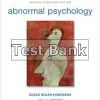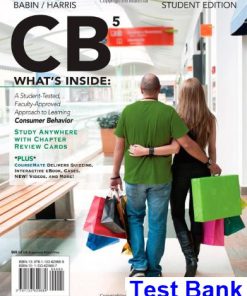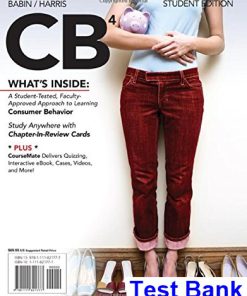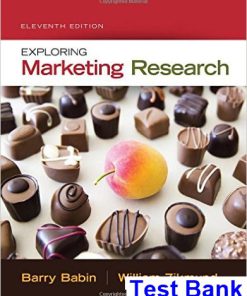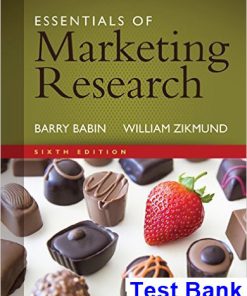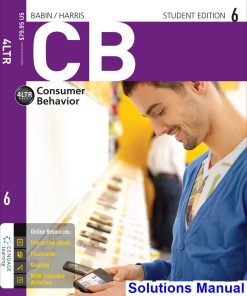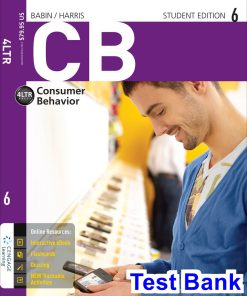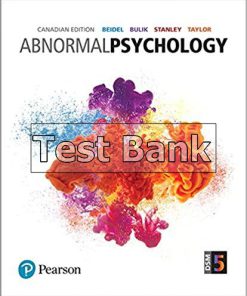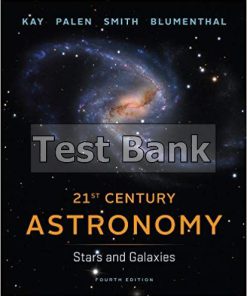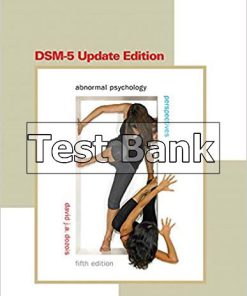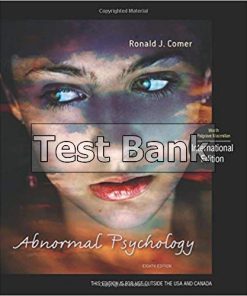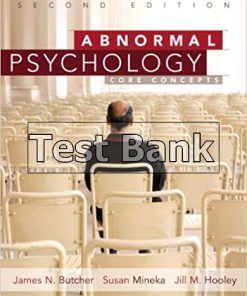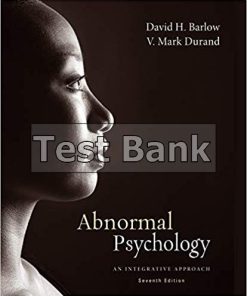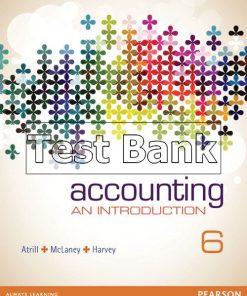CB 8th Edition Babin Test Bank
$50.00 Original price was: $50.00.$26.50Current price is: $26.50.
CB 8th Edition Babin Test Bank.
CB 8th Edition Babin Test Bank
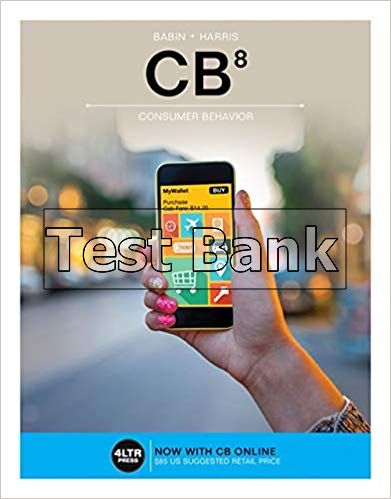
Product details:
- ISBN-10 : 0170291340
- ISBN-13 : 978-1305577244
- Author: Barry J. Babin
Learn your Consumer Behavior course YOUR Way with CB! CB’s easy-reference, paperback textbook presents course content through visually-engaging chapters as well as Chapter Review Cards that consolidate the best review material into a ready-made study tool. With the textbook or on its own, CB Online allows easy exploration of CB anywhere, anytime – including on your device! Collect your notes and create StudyBits� from interactive content as you go to remember what’s important. Then, either use preset study resources, or personalize the product through easy-to-use tags and filters to prioritize your study time. Make and review flashcards, review related content, and track your progress with Concept Tracker, all in one place and at an affordable price!
Table contents:
- Part 1: Introduction
- Chapter 1: What Is CB and Why Should I Care?
- 1-1 Consumption and Consumer Behavior
- 1-2 The Ways in Which Consumers Are Treated
- 1-3 The CB Field’s Role in Business, Society, and for Consumers
- 1-4 Different Approaches to Studying Consumer Behavior
- 1-5 Consumer Behavior Is Dynamic
- Chapter 2: Value and the Consumer Behavior Framework
- 2-1 The Consumer Value Framework and Its Components
- 2-2 Value and Its Two Basic Types
- 2-3 Marketing Strategy and Consumer Value
- 2-4 Market Characteristics: Market Segments and Product Differentiation
- 2-5 Analyzing Markets with Perceptual Maps
- 2-6 Value Today and Tomorrow-Customer Lifetime Value
- Part 1: Cases
- Part 2: Internal Influences
- Chapter 3: Consumer Learning Starts Here: Perception
- 3-1 Defining Learning and Perception
- 3-2 Consumer Perception Process
- 3-3 Applying the JND Concept
- 3-4 Implicit and Explicit Memory
- 3-5 Enhancing Consumers’ Attention
- 3-6 The Difference between Intentional and Unintentional Learning
- Chapter 4: Comprehension, Memory, and Cognitive Learning
- 4-1 What Influences Comprehension?
- 4-2 Multiple Store Theory of Acquiring, Storing, and Using Knowledge
- 4-3 Making Associations with Meaning as a Key Way to Learn
- 4-4 Associative Networks and Consumer Knowledge
- 4-5 Product and Brand Schemas
- Chapter 5: Motivation and Emotion: Driving Consumer Behavior
- 5-1 What Drives Human Behavior?
- 5-2 General Hierarchy of Motivation
- 5-3 Consumer Emotions and Value
- 5-4 Measuring Emotion
- 5-5 Differences in Emotional Behavior
- 5-6 Emotion, Meaning, and Schema-Based Affect
- Chapter 6: Personality, Lifestyles, and the Self-Concept
- 6-1 Personality and Consumer Behavior
- 6-2 Major Traits Examined in Consumer Research
- 6-3 Consumer Lifestyles, Psychographics, and Demographics
- 6-4 The Role of Self-Concept in Consumer Behavior
- 6-5 Self-Congruency Theory and Consumer Behavior
- Chapter 7: Attitudes and Attitude Change
- 7-1 Attitudes and Attitude Components
- 7-2 Functions of Attitudes
- 7-3 Hierarchy of Effects
- 7-4 Consumer Attitude Models
- 7-5 Attitude Change Theories and Persuasion
- 7-6 Message and Source Effects and Persuasion
- Part 2: Cases
- Part 3: External Influences
- Chapter 8: Group and Interpersonal Influence
- 8-1 Reference Groups
- 8-2 Social Power
- 8-3 Reference Group Influence
- 8-4 Social Media’s Role in Group and Interpersonal Influence
- 8-5 Word-of-Mouth and Consumer Behavior
- 8-6 Household Decision Making and Consumer Behavior
- Chapter 9: Consumer Culture
- 9-1 Culture and Meaning Are Inseparable
- 9-2 Using Core Societal Values
- 9-3 How Is Culture Learned?
- 9-4 Fundamental Elements of Communication
- 9-5 Emerging Cultures
- Chapter 10: Microcultures
- 10-1 Microculture and Consumer Behavior
- 10-2 Major U.S. Microcultures
- 10-3 Microculture Is Not Uniquely American
- 10-4 Demographic Analysis
- 10-5 Major Cultural and Demographic Trends
- Part 3: Cases
- Part 4: Situations and Decision Making
- Chapter 11: Consumers in Situations
- 11-1 Value in Situations?
- 11-2 Time and Consumer Behavior
- 11-3 Place Shapes Shopping Activities
- 11-4 Impulsive Shopping and Consumption
- 11-5 Places Have Atmospheres
- 11-6 Antecedent Conditions
- Chapter 12: Decision Making I: Need Recognition and Search
- 12-1 Consumer Decision Making
- 12-2 Decision-Making Perspectives
- 12-3 Decision-Making Approaches
- 12-4 Need Recognition, Internal Search, and the Consideration Set
- 12-5 External Search
- Chapter 13: Decision Making II: Alternative Evaluation and Choice
- 13-1 Evaluation of Alternatives: Criteria
- 13-2 Value and Alternative Evaluation
- 13-3 Product Categorization and Criteria Selection
- 13-4 Consumer Choice: Decision Rules
- Part 4: Cases
- Part 5: Consumption and Beyond
- Chapter 14: Consumption to Satisfaction
- 14-1 Consumption, Value, and Satisfaction
- 14-2 Value and Satisfaction
- 14-3 Other Post-Consumption Reactions
- 14-4 Theories of Post-Consumption Reactions
- 14-5 Consumer Satisfaction/Dissatisfaction Measurement Issues
- 14-6 Disposing of Refuse
- Chapter 15: Beyond Consumer Relationships
- 15-1 Outcomes of Consumption
- 15-2 Complaining and Spreading WOM
- 15-3 Switching Behavior
- 15-4 Consumer Loyalty
- 15-5 Link the Concept of Consumer Co-Creation of Value to Consumption Outcomes
- Chapter 16: Consumer and Marketing Misbehavior
- 16-1 Consumer Misbehavior and Exchange
- 16-2 Distinguish Consumer Misbehavior from Problem Behavior
- 16-3 Marketing Ethics and Misbehavior
- 16-4 Corporate Social Responsibility
- 16-5 Regulation of Marketing Activities
- 16-6 Public Criticism of Marketing
- Part 5: Cases
- Endnotes
- Glossary
- Subject Index
- Name Index
- Products/Organizations Index
People also search:
cb 8th edition pdf free
|
cb numbers
cb customer service
10-8 cb code
what is cb 80
|
Instant download after Payment is complete
You may also like…
Test Bank


